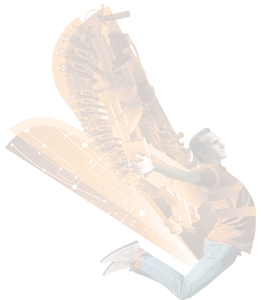Society & Partner Information
- ACRM - The American Congress of Rehabilitation Medicine
- ICORR - International Consortium for Rehabilitation Robotics
- IISART - The International Industry Society in Advanced Rehabilitation Technology
- IFESS - International Functional Electrical Stimulation Society
- ISPO-NL: International Society for Prosthetics and Orthotics – Nederland
- ISVR - International Society for Virtual Rehabilitation
- MiNT - Masterclass in Neurotechnology
- NSRM - Netherlands Society of Rehabilitation Medicine
- RESC - The Competence Centre for Rehabilitation Engineering and Science
RESC joins the RehabWeek 2022 as a partner presenting a panel discussion on financial models for innovative assistive technology (Please see Panel Discussion 2)
What is the comptence centre’s main goal?
The Competence Centre for Rehabilitation Engineering and Science (RESC) at ETH Zurich coordinates ETH Zurich’s Rehab Initiative. RESC is a nexus of expertise from academia, hospitals, industry, government, healthcare, disability organisations, and other NPOs. Its mission is the establishment of a holistic rehabilitation approach to better meet the needs of people with physical disabilities by facilitating research and transfer, fostering an interdisciplinary network, and raising awareness along the continuum-of-care.
Is there a personal story behind the establishment of the competence centre?
The idea for the Rehab Initiative at ETH Zurich and subsequently the establishment of RESC, were initially conceived by a personal observation of Robert Riener, Professor for Sensory-Motor Systems at ETH Zurich and Balgrist University Hospital, Switzerland. The experience of Cybathlon 2016 – a competition in which people with disabilities solve everyday tasks using state-of-the-art technological assistive systems – changed Robert Riener’s perspective on rehabilitation. “I discovered that the actual needs of people with disabilities do not feed into the development of assistive technologies enough, and conversely that major research discoveries aren’t finding their way into practical applications,” says Riener. Yet in-depth knowledge about the effects of prevention, therapy and training is fundamental to improvements in these areas. For this reason, ETH Zurich, where a third of the professors across departments work directly or indirectly in medical research, along with experts in other fields, such as computer science, robotics, the humanities, health economics and architecture, made the translation of its research findings into applicable solutions for patients and individuals with phyisical disabilities a top priority.
Why did you decide to take part in the RehabWeek?
As a competence centre that fosters collaboration, RESC relies on a strong network of stakeholders from research, healthcare, academia, industry, and other decision makers. The RehabWeek is an ideal setting for knowledge exchange and building new relationships with organisations who share our vision and mission. While we are currently mainly operating in Switzerland (with international researchers in our member’s research groups), we are keen on learning from and sharing with colleagues across the world.
Why is RehabWeek unique and why should people attend?
The RehabWeek provides the latest insights into rehabilitation engineering and science and is a valuable opportunity to connect with colleagues in an international and interdisciplinary setting.
What do you think will be the next big issue in the field? Why?
RESC believes in the great potential of a holistic rehabilitation approach, where the core fields such as medicine and technology work side-by-side with experts from economics, legislation, environmental systems such as architecture, and the humanities. Progress in the currently very complex field of rehabilitation and care can only be achieved by transdiciplinarity. A good example is the importance of involving users and economists when designing new rehabilitation technologies.
Any success story you would like to share
ETH Zurich’s Rehab Initiative recently secured funding of CHF 1 million to support research and development projects in the field of accident and occupational health rehabilitation. The donor is Suva, the Swiss National Accident Insurance Fund, an important part of Switzerland’s social security system. Furthermore, the Swiss Paraplegic Foundation supports the establishment and operation of the ETH research group "Personalised Health Care for Spinal Cord lnjury" and associated research calls for ten years with funding of CHF 5 million. The research group is based at the Swiss Paraplegic Centre, the specialist clinic for spinal cord, back and respiratory medicine in Switzerland. RESC is pleased with our partners’ commitment to the advancement of rehabilitation research and its translation. It shows us that the approach we take with the Rehab Initiative addresses a real need in society.
Society & Partner Information
- ACRM - The American Congress of Rehabilitation Medicine
- ICORR - International Consortium for Rehabilitation Robotics
- IISART - The International Industry Society in Advanced Rehabilitation Technology
- IFESS - International Functional Electrical Stimulation Society
- ISPO-NL: International Society for Prosthetics and Orthotics – Nederland
- ISVR - International Society for Virtual Rehabilitation
- MiNT - Masterclass in Neurotechnology
- NSRM - Netherlands Society of Rehabilitation Medicine
- RESC - The Competence Centre for Rehabilitation Engineering and Science


